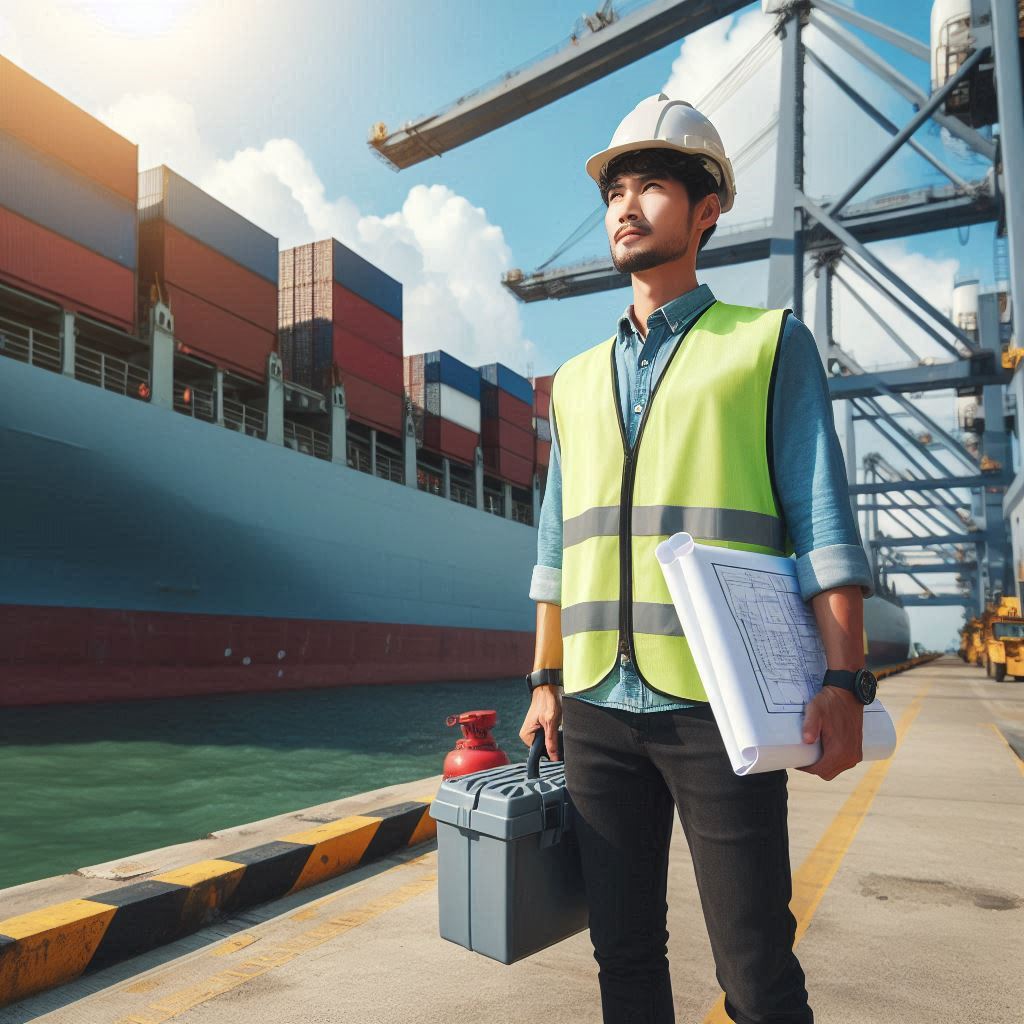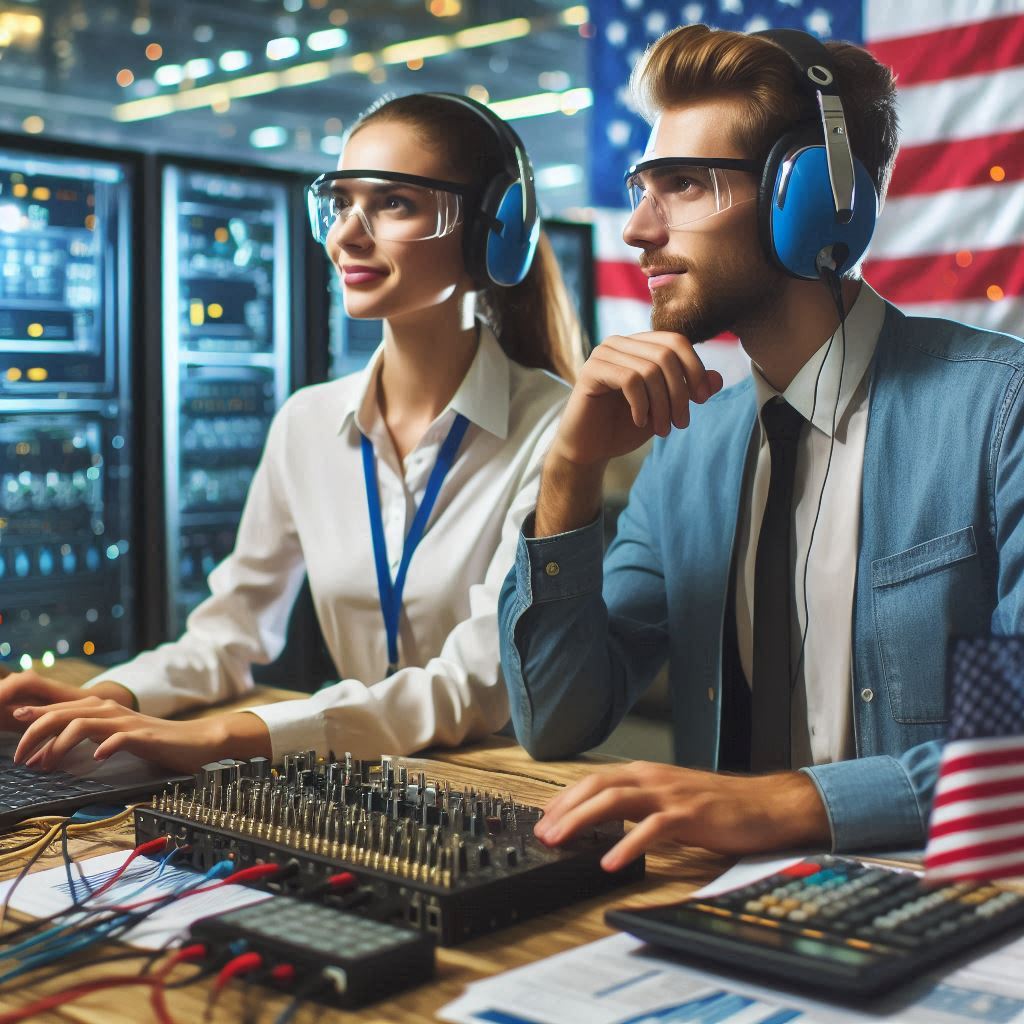Introduction
Marine engineering is the branch of engineering focused on the design, construction, and maintenance of marine vessels and structures.
This field involves working on ships, submarines, offshore platforms, and other marine technologies.
Marine engineers ensure these systems operate safely and efficiently in challenging marine environments.
The importance of marine engineering in today’s world cannot be overstated.
Marine engineers play a crucial role in global trade, as ships transport a significant portion of the world’s goods.
They are also essential in offshore energy production, including oil and gas extraction and renewable energy sources like offshore wind farms.
Marine engineering supports environmental protection by designing more efficient and less polluting ships.
Advanced marine technologies help reduce emissions and prevent oil spills, contributing to ocean conservation efforts.
Marine engineers also work on cutting-edge projects, such as autonomous vessels and underwater robotics, which push the boundaries of technology.
This blog post will explore the future of marine engineering, focusing on emerging trends and predictions.
We will discuss technological advancements, evolving industry standards, and the impact of environmental regulations.
By understanding these developments, we can better appreciate the ongoing innovations shaping the marine engineering field.
Overview of current trends in marine engineering
Advancements in Technology
Marine engineering is experiencing a wave of technological advancements.
The integration of automation and digital systems is revolutionizing ship operations.
Modern vessels are equipped with sophisticated control systems that streamline navigation and operational processes.
For instance, advanced sensor technologies and real-time data analytics are significantly improving navigation accuracy and maintenance procedures.
Integrated bridge systems are becoming standard, offering a unified platform for monitoring and controlling various ship functions.
Innovations in communication technologies, such as satellite and high-speed internet, are enhancing connectivity and enabling more effective remote operations and monitoring.
Additionally, the development of advanced simulation tools allows engineers to test and refine designs before implementation, leading to more efficient and reliable marine engineering solutions.
New Materials Being Used
The use of new materials is a critical trend in marine engineering.
Engineers are increasingly incorporating advanced composites and lightweight materials into ship design.
These materials, such as carbon fiber and high-strength alloys, offer exceptional durability and resistance to harsh marine environments.
They contribute to increased fuel efficiency by reducing the overall weight of vessels, which in turn lowers fuel consumption and operational costs.
The development of corrosion-resistant materials is also enhancing the longevity and reliability of marine structures.
These innovations are not only improving performance but also reducing maintenance requirements and extending the lifespan of vessels.
As research progresses, the application of these materials is expected to become more widespread, driving further advancements in shipbuilding and marine technology.
The Impact of Sustainability on Marine Engineering
Sustainability is increasingly influencing marine engineering practices.
Reducing the environmental impact of maritime operations is a primary focus.
Engineers are developing and implementing technologies to lower greenhouse gas emissions and enhance energy efficiency.
The use of alternative fuels, such as liquefied natural gas (LNG) and hydrogen, is gaining momentum.
These fuels offer a cleaner alternative to traditional marine fuels, helping to reduce the carbon footprint of shipping activities.
Electric and hybrid propulsion systems are also becoming more prominent.
These systems provide a quieter and more efficient alternative to conventional engines, further reducing emissions and fuel consumption.
Regulations and standards are evolving to support these sustainability efforts.
International maritime organizations are introducing stricter emission and waste management regulations.
Marine engineers must stay informed about these changes to ensure compliance and contribute to environmental protection.
Additionally, the development of autonomous vessels is being driven by the goal of enhancing efficiency and safety while reducing human error.
These vessels utilize advanced artificial intelligence and machine learning for navigation and operation, promising a more sustainable and error-free maritime industry.
Basically, the field of marine engineering is rapidly advancing with significant improvements in technology, materials, and sustainability practices.
These trends are reshaping the industry, leading to more efficient, eco-friendly, and innovative maritime solutions.
As marine engineering continues to evolve, the focus on these trends will be crucial in shaping the future of maritime transportation
Growth of Autonomous Vessels in the Marine Industry
The Rise of Unmanned Ships
The marine industry is witnessing a significant rise in unmanned ships.
These autonomous vessels operate without human intervention, relying on advanced technologies for navigation and control.
Innovations in sensors, cameras, and radar systems enable these ships to detect obstacles and navigate safely.
As technology progresses, unmanned ships are becoming a practical reality rather than a distant concept.
Benefits of Autonomous Vessels
Autonomous vessels offer several key benefits.
Firstly, they enhance safety by minimizing human error, which is a leading cause of maritime accidents.
These ships can operate continuously without the need for rest, boosting efficiency and productivity.
Economically, unmanned vessels can lower operational costs by eliminating crew expenses, positively impacting shipping companies’ bottom lines.
Additionally, reduced crew requirements may lead to lower insurance premiums due to decreased accident risks.
Challenges and Obstacles Faced in Implementing Autonomous Technology
Despite their advantages, implementing autonomous technology presents several challenges.
Regulatory uncertainty is a major obstacle, as many countries lack clear guidelines for unmanned vessel operations.
Ensuring compliance with international maritime laws and conventions is essential for widespread adoption.
Cybersecurity is another significant concern.
Autonomous vessels depend heavily on digital systems, making them vulnerable to cyberattacks.
Protecting these systems from hacking and other threats is crucial for maintaining operational integrity.
Technical challenges also arise.
Developing and maintaining reliable autonomous systems requires advanced technology and extensive testing.
Ensuring these systems function effectively in various weather conditions and sea states is a substantial task.
Additionally, integrating autonomous vessels into existing maritime infrastructure requires meticulous planning and coordination.
Public perception and acceptance can be hurdles as well.
Some stakeholders, including maritime workers and the public, may be wary of unmanned ships.
Building trust in autonomous technology and proving its safety and effectiveness are vital for overcoming resistance.
Training and workforce development will play a role in the adoption of autonomous vessels.
Mariners and engineers will need new skills to work with these advanced technologies and manage autonomous systems effectively.
In summary, the rise of unmanned ships is transforming the marine industry.
Autonomous vessels offer enhanced safety, efficiency, and cost savings but face challenges related to regulation, cybersecurity, technology, and public perception.
As technology advances, these unmanned ships are expected to become an integral part of the maritime sector, shaping the future of marine engineering.
Increased focus on renewable energy in marine engineering
The Shift Towards Alternative Fuels
The marine engineering sector is undergoing a major transformation with a shift towards alternative fuels.
Traditional marine fuels, such as heavy fuel oil and marine diesel, are being gradually replaced by cleaner and more sustainable options.
Hydrogen is emerging as a leading alternative due to its zero-emission profile.
When hydrogen is burned, it produces only water vapor, making it an attractive choice for reducing greenhouse gas emissions.
Additionally, hydrogen fuel cells can be used to power marine vessels, offering an efficient and environmentally friendly energy source.
Biofuels are another significant development in the move towards alternative fuels.
Derived from organic materials such as plant oils and animal fats, biofuels provide a more sustainable option compared to fossil fuels.
They reduce carbon emissions and are renewable, contributing to a decrease in the overall carbon footprint of marine operations.
The adoption of biofuels is becoming more common as technology advances and production scales up, making them a viable choice for marine transportation.
This shift towards alternative fuels is driven by stringent emission regulations and a growing emphasis on reducing environmental impact.
Marine engineers and ship operators are increasingly exploring and investing in these cleaner fuels to meet regulatory requirements and to align with global sustainability goals.
The transition to alternative fuels is not only beneficial for the environment but also helps in maintaining compliance with evolving standards and reducing operational costs associated with fuel consumption.
The Use of Wind and Solar Energy in Marine Transportation
Wind energy is making a notable impact on marine transportation.
Modern vessels are incorporating innovative wind-assisted propulsion systems to harness the power of the wind.
Technologies such as wing sails, kites, and rotor sails are being used to capture wind energy and convert it into thrust, reducing the reliance on conventional fuels.
These systems can significantly cut fuel consumption and lower greenhouse gas emissions, contributing to more sustainable marine operations.
Solar energy is also playing a crucial role in transforming marine transportation.
Solar panels are being installed on ship decks to capture sunlight and generate electricity.
This renewable energy source powers onboard systems and reduces the need for diesel generators.
By integrating solar panels, vessels can decrease their fuel consumption, lower operational costs, and reduce their environmental footprint.
The use of solar energy is becoming more prevalent as technology improves and the cost of solar panels decreases.
The combination of wind and solar energy technologies represents a significant advancement in marine engineering.
These renewable energy sources are not only environmentally friendly but also offer operational benefits, such as reduced fuel costs and increased energy efficiency.
As the technology continues to evolve, we can expect to see even greater adoption of wind and solar energy in marine transportation.
The Impact of Sustainability Concerns on Engineering Practices
Sustainability concerns are profoundly impacting engineering practices within the marine industry.
Engineers are increasingly prioritizing environmental considerations in their designs and operations.
The growing emphasis on sustainability is driving the development of new technologies and practices aimed at reducing emissions and improving energy efficiency.
New regulations and industry standards are pushing for more sustainable practices, influencing the way marine engineers approach their work.
These regulations emphasize the need to reduce emissions, enhance fuel efficiency, and implement cleaner technologies.
As a result, engineers are focusing on integrating renewable energy sources, such as wind and solar, into marine vessel designs and operations.
Furthermore, the push for sustainability is leading to advancements in energy management systems and energy storage solutions.
Engineers are developing sophisticated systems to balance energy supply and demand, optimize the use of renewable resources, and improve overall efficiency.
This focus on sustainability is also driving research and innovation in alternative fuels and green technologies.
Reflecting a broader commitment to environmental stewardship and a more sustainable future for marine engineering.
Read: How to Stay Updated in Environmental Engineering Field
Incorporation of Artificial Intelligence in Marine Engineering
The Role of AI in Enhancing Efficiency and Safety
Artificial Intelligence (AI) is making significant strides in marine engineering, particularly in enhancing both efficiency and safety.
AI systems are revolutionizing vessel operations by automating processes that traditionally relied on human input.
For instance, AI-driven algorithms can analyze extensive data sets to optimize navigation and predict potential equipment failures.
This predictive capability allows for proactive maintenance, addressing issues before they escalate into serious problems.
By minimizing unexpected downtime and reducing the need for emergency repairs, AI contributes to more cost-effective and reliable marine operations.
AI‘s impact on safety is equally profound.
Advanced AI systems assist in real-time decision-making, reducing the likelihood of human error.
AI enhances collision avoidance systems, helping vessels navigate safely through congested or hazardous environments.
Additionally, AI can monitor and manage various operational parameters, such as engine performance and fuel efficiency, to ensure that all systems are functioning within safe operational limits.
This proactive approach to safety not only protects crew members but also reduces the risk of environmental damage from accidents or malfunctions.
Examples of AI Applications in Marine Engineering
Several notable examples illustrate how AI is currently being applied in marine engineering.
One prominent application is autonomous ships, which utilize AI to navigate without human intervention.
These vessels employ sophisticated AI algorithms for route planning and collision avoidance, making maritime travel safer and more efficient.
Companies like Rolls-Royce and W‘rtsil‘ are at the forefront of developing autonomous shipping technologies, showcasing AI‘s transformative potential in the industry.
AI is also playing a crucial role in environmental monitoring.
Marine engineering relies on AI-driven sensors and data analytics to track water quality, detect pollution, and ensure regulatory compliance.
For instance, AI algorithms analyze data from sensors to identify changes in water chemistry or detect the presence of contaminants.
This real-time monitoring helps protect marine ecosystems and ensures that vessels adhere to environmental regulations.
In addition, AI contributes to operational efficiency through intelligent ballast management systems.
These systems use AI to optimize ballast adjustments, improving stability and fuel efficiency.
By automating ballast control, AI helps reduce the manual effort required and enhances overall operational performance.
Predictions for Future Developments in AI Technology for the Marine Industry
Looking ahead, the future of AI in marine engineering is filled with exciting possibilities.
One major prediction is the widespread adoption of fully autonomous fleets.
These fleets will operate with minimal human oversight, driven by advanced AI systems capable of handling complex maritime operations.
The integration of AI with blockchain technology could further enhance security and traceability in maritime logistics, providing a secure and transparent framework for tracking cargo and vessel movements.
Moreover, AI‘s role in predictive analytics is expected to become even more sophisticated.
Future AI models will offer more accurate forecasts for weather and environmental conditions, improving risk assessment and decision-making.
This enhanced predictive capability will enable better preparation for adverse conditions and more efficient route planning.
The development of smart shipping technologies, powered by AI, will likely advance significantly.
These innovations will focus on optimizing vessel performance, reducing emissions, and enhancing overall safety.
As AI technology evolves, its integration into marine engineering will deepen, leading to a more advanced, efficient, and secure maritime industry.
Read: Environmental Engineering Software and Tools

Importance of Data Analytics in Marine Engineering
The Role of Data Analytics in Improving Performance
Data analytics is revolutionizing marine engineering by significantly enhancing performance across various dimensions.
The integration of advanced analytics allows marine engineers to monitor ship operations in real-time.
By continuously collecting data from various sensors and onboard systems, engineers gain valuable insights into fuel consumption, engine performance, and overall operational efficiency.
This real-time monitoring enables engineers to make immediate adjustments, optimizing performance and reducing operational costs.
For example, by analyzing data on fuel usage, engineers can identify inefficiencies and implement strategies to minimize consumption, leading to cost savings and a smaller environmental footprint.
Moreover, data analytics enables predictive maintenance, which further improves performance.
By analyzing historical and real-time data, engineers can predict when equipment is likely to fail or require maintenance.
This proactive approach prevents unexpected breakdowns and minimizes downtime, ensuring smoother and more efficient operations.
Engineers can also use data to refine and enhance ship designs, leading to more efficient and reliable marine vessels.
Overall, data analytics is crucial in driving performance improvements and operational excellence in marine engineering.
The Use of Big Data in Decision-Making Processes
Big data has become a cornerstone in the decision-making processes of marine engineering.
The vast amounts of data collected from various sources, such as ship sensors, satellite imagery, and weather forecasts, provide a comprehensive picture of maritime operations.
This wealth of information is analyzed to derive actionable insights that inform critical decisions.
For instance, big data analytics helps in forecasting equipment failures, optimizing routes, and enhancing safety protocols.
One of the key advantages of big data in marine engineering is its ability to improve predictive capabilities.
By analyzing large datasets, engineers can identify patterns and trends that might not be apparent from smaller data sets.
This enables more accurate forecasting and better-informed decision-making.
For example, analyzing data on weather patterns and sea conditions allows for optimized routing, reducing fuel consumption and improving safety.
Additionally, big data supports the development of more effective maintenance schedules and operational strategies, leading to enhanced efficiency and reduced costs.
Predictions for the Future of Data Analytics in Marine Engineering
The future of data analytics in marine engineering is poised for remarkable advancements and transformations.
As technology continues to evolve, we can expect more sophisticated analytics tools and techniques to emerge.
Machine learning algorithms and artificial intelligence will play a significant role in processing and interpreting complex datasets.
These advancements will enable even more precise predictions and optimizations, leading to smarter and more autonomous marine systems.
Predictive maintenance will become increasingly advanced, with engineers able to anticipate and address potential issues before they arise.
This shift towards proactive maintenance will minimize operational disruptions and extend the lifespan of marine assets.
Additionally, data analytics will drive innovations in eco-friendly maritime technologies.
By analyzing data on fuel consumption and emissions, engineers will develop more efficient propulsion systems and greener ship designs, contributing to reduced environmental impact.
Overall, the future of data analytics in marine engineering will bring enhanced performance, safety, and sustainability.
Embracing these trends and technologies will be crucial for staying competitive and achieving long-term success in the industry.
Read: Environmental Engineers in the Mining Industry
Challenges and opportunities in marine engineering education
The Need for Skilled Professionals in the Field
The marine engineering sector is rapidly advancing, leading to an increased demand for skilled professionals.
Innovations in ship design, propulsion systems, and marine technologies require engineers who are adept in these areas.
As the industry evolves, professionals need specialized knowledge to address new challenges.
For example, advancements in eco-friendly ship designs and automated systems necessitate expertise in cutting-edge technologies.
This growing demand underscores the need for engineers who can effectively navigate and manage these developments.
The increasing complexity of maritime operations and regulatory requirements further amplifies the need for highly trained and knowledgeable professionals.
Transform Your Career Today
Unlock a personalized career strategy that drives real results. Get tailored advice and a roadmap designed just for you.
Start NowThe Importance of Continuous Learning and Development
In marine engineering, continuous learning and development are crucial for maintaining professional competence.
The field is dynamic, with technological advancements and new regulations emerging regularly.
Engineers must stay abreast of these changes to remain effective in their roles.
Continuous education helps professionals adapt to innovations such as advanced propulsion systems, autonomous ships, and green technologies.
Educational institutions must offer updated curricula that reflect current industry trends.
Lifelong learning opportunities, including professional development courses and certifications, are essential for career progression.
Engaging in continuous learning ensures that engineers can integrate new technologies and practices into their work, keeping them competitive in the evolving job market.
Potential Career Opportunities in Marine Engineering
Marine engineering presents diverse and promising career opportunities.
Engineers can specialize in various areas, including ship design, construction, and maintenance.
Those interested in propulsion systems can focus on developing and optimizing marine engines and fuel systems.
Additionally, the growing emphasis on sustainability and environmental protection opens new avenues in green technologies and eco-friendly practices.
Career opportunities also exist in research and development, where engineers work on innovative solutions to address maritime challenges.
The rise of autonomous vessels and advanced marine technologies further expands career prospects, offering roles in designing, implementing, and managing these systems.
With a wide range of potential career paths, marine engineering provides numerous opportunities for professionals to contribute to the industry’s advancement and address its evolving needs.
Read: Tips for Writing Environmental Engineering Reports
You Might Also Like: Certification Options for Automotive Engineers
See Related Content: Challenges Faced by Marine Engineers at Sea
Impact of Climate Change on the Future of Marine Engineering
The challenges posed by rising sea levels and extreme weather events
Climate change is having a profound impact on marine engineering.
One of the most pressing challenges is rising sea levels.
As global temperatures increase, polar ice caps are melting, contributing to higher ocean levels.
Engineers must now design structures that can withstand these elevated water levels.
This requires rethinking traditional construction methods and materials.
Ports, harbors, and coastal infrastructure are at increased risk of flooding and damage.
Extreme weather events, such as hurricanes and typhoons, are also becoming more frequent and severe.
These events subject marine infrastructure to unprecedented stress.
Offshore platforms, bridges, and coastal defenses face greater risks from high winds, storm surges, and heavy rainfall.
Engineers must anticipate these extreme conditions and incorporate more robust safety measures into their designs.
The importance of sustainable practices in the industry
Addressing these challenges requires a strong focus on sustainability.
Marine engineers are increasingly adopting green technologies to minimize environmental impacts.
Sustainable practices are vital for reducing the carbon footprint of marine operations.
For example, the integration of renewable energy sources, such as wind and solar power, is becoming more common in marine engineering projects.
These technologies reduce reliance on fossil fuels and lower greenhouse gas emissions.
Additionally, engineers are using energy-efficient designs and materials to enhance sustainability.
Advanced materials that resist corrosion and extend the lifespan of structures are being developed.
The use of low-emission propulsion systems for vessels and machinery is also gaining traction.
These innovations help mitigate the environmental impact of marine engineering activities and contribute to overall ecological preservation.
Predictions for future developments in response to climate change
Looking ahead, the future of marine engineering will be shaped by the need for adaptability and resilience.
Engineers will focus on developing flexible and scalable solutions to handle unpredictable climate scenarios.
This includes designing structures that can be easily modified or reinforced as conditions change.
Coastal cities will incorporate advanced flood protection systems, such as sea walls and levees, to safeguard against rising water levels.
Offshore installations will implement enhanced storm surge defenses and erosion control measures.
Advances in data collection and predictive modeling will play a crucial role in future developments.
Improved forecasting tools will enable engineers to better prepare for extreme weather events.
Real-time monitoring systems will provide up-to-date information on environmental conditions, aiding in risk management and decision-making.
Collaboration between marine engineers, environmental scientists, and policymakers will be essential in developing effective climate adaptation strategies.
This interdisciplinary approach will ensure that marine infrastructure is both sustainable and resilient in the face of ongoing climate change.
Learn More: Impact of Electric Vehicles on Automotive Engineering
Conclusion
Marine engineering is rapidly evolving, driven by technology and environmental needs.
Key trends include the rise of eco-friendly designs, advanced propulsion systems, and autonomous vessels.
Smart technology, such as IoT and AI, is reshaping how marine engineers design and operate ships.
Renewable energy sources and efficient hull designs are reducing the carbon footprint of maritime operations.
Additionally, regulatory pressures are pushing the industry toward sustainable practices.
Staying updated with these trends is crucial for anyone in the marine engineering field.
The industry‘s dynamic nature means that new developments can quickly alter the landscape.
Professionals must be proactive in learning about innovations to remain competitive and effective.
This involves continuous education and engagement with the latest research and technologies.
Exploring opportunities in marine engineering can lead to exciting and rewarding careers.
The field offers diverse paths, from designing cutting-edge vessels to developing new environmental technologies.
By embracing the changes and challenges, you can contribute to shaping the future of marine engineering.
In summary, the future of marine engineering promises to be both challenging and promising.
The industry‘s shift toward sustainability and technological advancements creates numerous opportunities.
Staying informed and adaptable will help you thrive in this evolving field.
Embrace the trends, seek out new knowledge, and explore the many opportunities available.
[E-Books for Sale]
The Big Book of 500 High-Paying Jobs in America: Unlock Your Earning Potential
$19.99 • 500 High-Paying Jobs • 330 pages
Explore 500 high-paying jobs in America and learn how to boost your career, earn more, and achieve success!
See All 500 High-Paying Jobs of this E-Book
1001 Professions Without a Degree: High-Paying American Jobs You Can Start Now
$19.99 • 1001 Professions Without a Degree • 174 pages
Discover 1001 high-paying jobs without a degree! Unlock career tips, skills, and success strategies for just $19.99!




